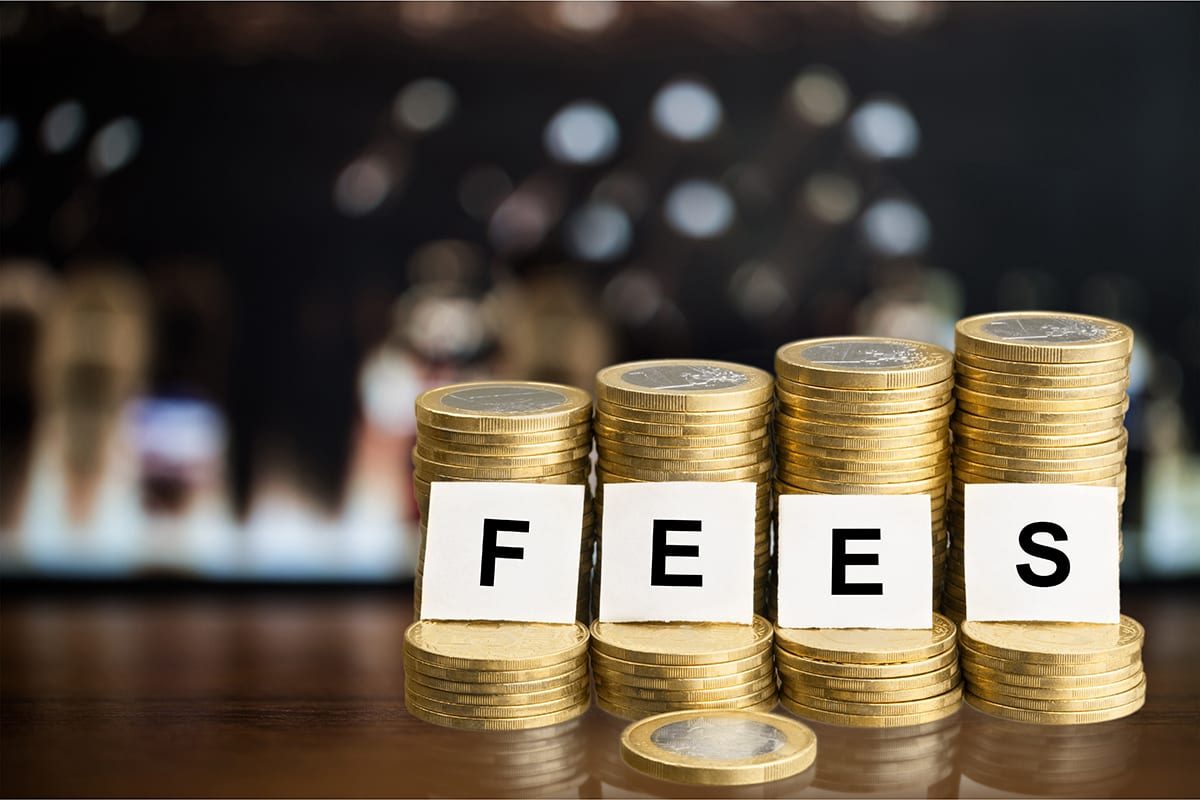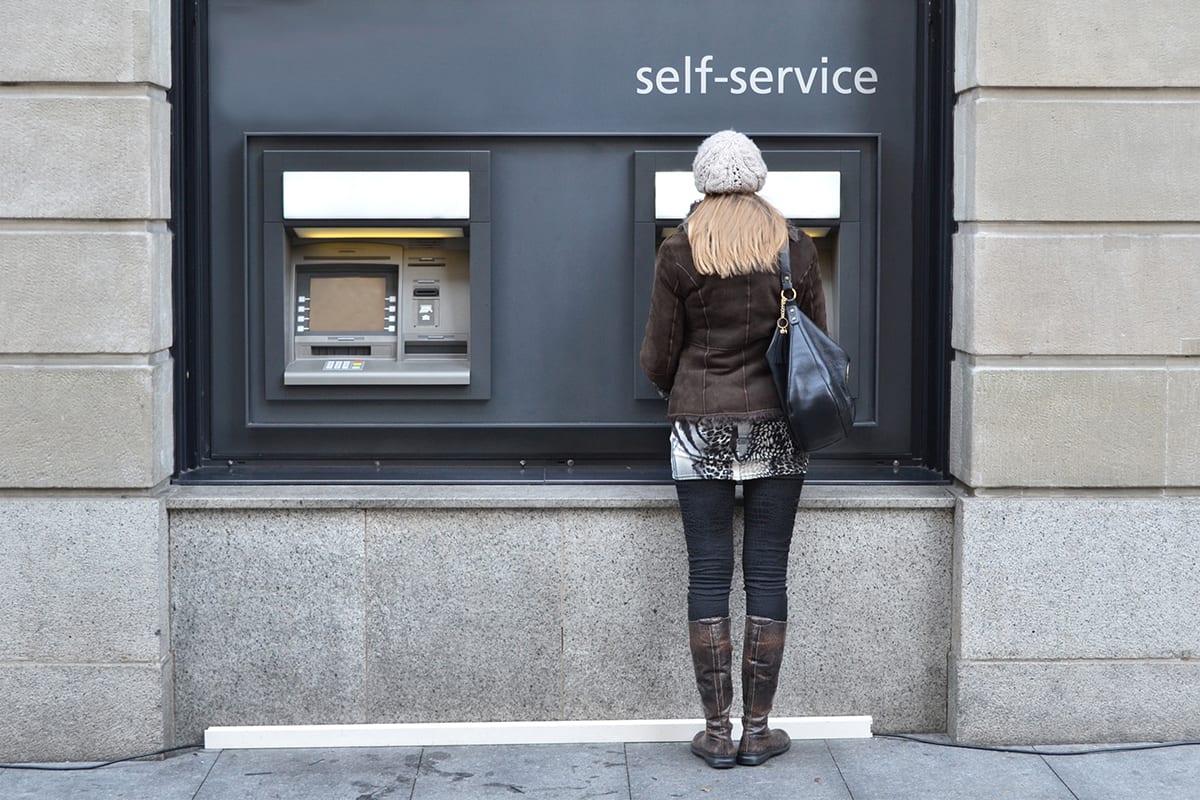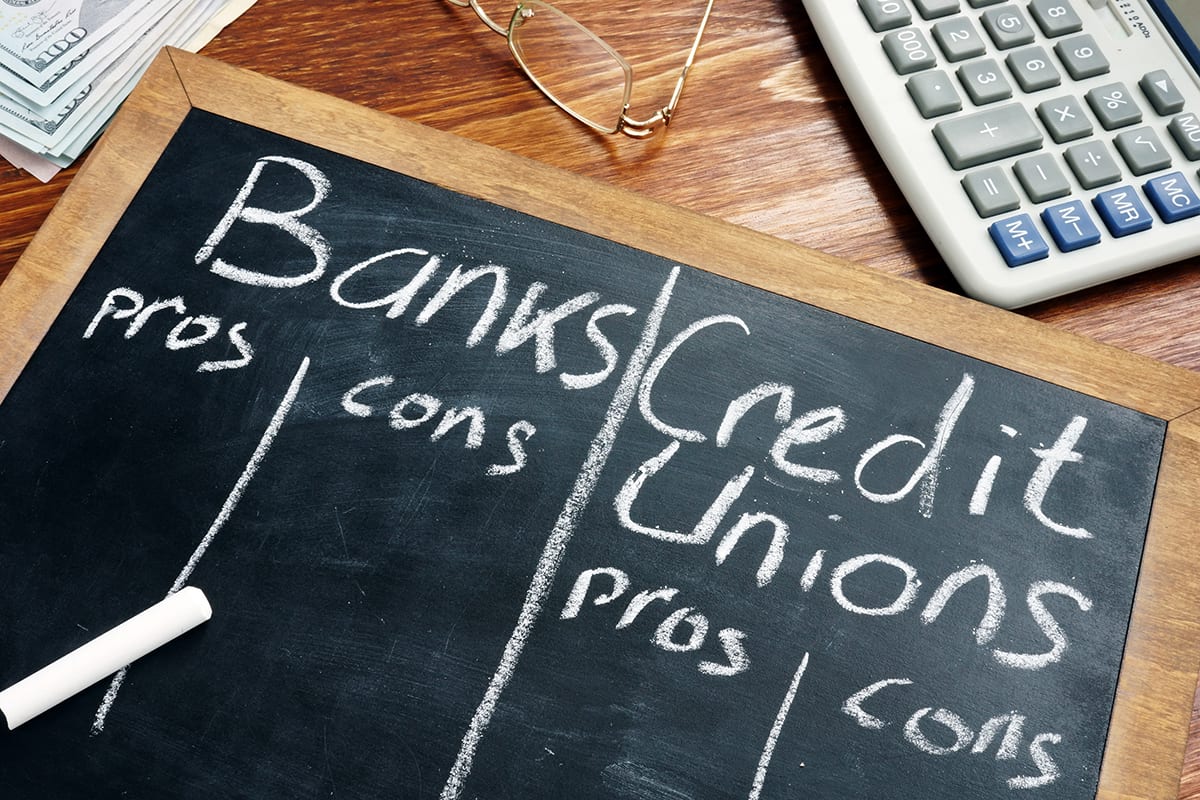Last Updated on March 28, 2025
Banks and credit unions are both financial institutions. They’re both spots you can park your cash, set up savings and checking accounts, and even take out loans and mortgages.
But are the two one and the same? Definitely not.
In order to understand the difference between a credit union and bank, it’s best to weigh the unique pros and cons of each. The best option for your household really depends on your where you live, what type of accounts and financial products you’ll need, and the kind of customer service you expect.
Not sure which option is best for your finances? Let’s break down the major differences between the two now.
What’s a Credit Union?
A credit union is a financial institution that’s owned by its members. Technically a “cooperative,” the day-to-day operations of a credit union are generally run by a small staff, led by a volunteer or elected board of directors. Members can borrow money from the pooled deposits of the entire membership, usually at a lower rate than what banks can offer. Credit unions also offer checking accounts, savings accounts, debit cards, and various types of investments.

Most credit unions operate in only one or two communities or regions, making them very community- and customer-focused. However, there are some larger credit unions. A good example of a credit union is Navy Federal. The country’s largest credit union, it currently has more than 8 million members and over 300 locations nationwide.
What’s a Bank?
A bank is a financial institution that is owned by investors — investors looking to make a profit through the bank’s various products and services. Banks are typically larger, wealthier organizations than credit unions, and they usually have a wider footprint across the country.
Banks offer everything from checking and savings accounts to CDs, safe deposit boxes, and business banking. They also offer a wide variety of loans, credit cards, and mortgage products.
Profit or Non-profit: The Major Difference
The biggest difference between a credit union and bank is that one type of institution is for-profit (banks), while the other is non-profit (credit unions). This typically means that banks will have higher fees and added costs. They usually make up for these higher costs with more locations, a variety of rewards programs, and stronger technology.

Credit unions, on the other hand, charge lower fees due to their non-profit status. Because they’re smaller and backed by fewer dollars, they typically offer fewer advanced technologies, fewer locations, and fewer rewards/cash-back options.
Despite what many assume, there’s no difference between a credit union and bank in how “safe” your money is at either. Banks are insured through the Federal Deposit Insurance Corporation, while deposits at credit unions are backed by the National Credit Union Administration. Both options are solid choices if you’re looking to safeguard your hard-earned money.
Pros and Cons of Banks
The major advantage of banks is that they’re typically large, well-funded entities. With that comes certain advantages: numerous, easily accessible locations; more ATMs; and better technology, including mobile apps, mobile depositing, and even automatic fraud protection.

On top of this, banks can usually offer more rewards and cash-back programs, which can help you save (or even earn) more in the long run.
There are, however, drawbacks to using a bank. For one, banks aren’t usually known for their stellar customer service. If you’re looking for a lot of handholding and one-on-one attention, they’re typically not your best bet. Additionally, bank fees are almost always higher, meaning higher costs when you overdraft your account, more expensive checks and replacement cards, and higher annual fees on certain credit cards and savings accounts.
Another big difference between a credit union and bank is that banks generally charge higher interest rates on loans and mortgages since they’re looking to make a profit. They’re also typically stricter when offering up these loans, meaning you’ll need a higher credit score and stronger credit profile on the whole to qualify.

Pros
- Many convenient locations
- Better technology
- More rewards/cash-back programs
- More products and services
Cons
- Customer service often lacks
- Higher fees
- Lower interest rates on savings and deposits
- Higher interest rates on loans and mortgages
- Less flexibility in lending
Pros and Cons of Credit Unions
Credit unions are technically “member-owned,” with your membership fee paying for the services you get and the financial products you have access to. With that said, a membership fee isn’t the only barrier to using a credit union. Before even getting to that point, you’ll need to qualify for membership first.
Generally, credit union membership is reserved for members of certain community groups (school districts, churches, neighborhoods, or employers). You may also have to meet other eligibility requirements before you can join in.

If you can make the cut, credit unions offer a slew of perks, including lower fees and stellar customer service. They’re also known for having higher interest rates on savings accounts and deposits as well as lower rates on loans and mortgages. In the long run, that can mean more cash in your pocket or, better yet, an easier time when retirement rolls around.
Finally, another key difference between a credit union and bank is that credit unions typically have more flexibility in lending funds. If your credit is less than stellar or you’ve had trouble getting a loan or credit card elsewhere, a credit union may be able to help you out.
Pros
- More personalized customer service
- Lower fees
- Higher interest rates on savings and deposits
- Lower interest rates on loans and mortgages
- More community-focused
- More flexibility in lending
Cons
- Less convenient/fewer locations
- Membership fees
- Not everyone is eligible
- Less advanced technology
- Fewer rewards/cash-back programs
- Fewer products and services
Which Should You Use?

Ultimately, in deciding whether to go with a credit union or bank, there’s no right or wrong answer in deciding where to stash your cash. You should look at the bigger picture (both short- and long-term) and see which fits in with your financial goals and needs best.
Specifically, you’ll want to think about:
- Account fees and charges: How much does it cost monthly and annually for a checking account? A savings account? How do the fees break down for overdrafts, checks, maintenance, and other expenses?
- Access: What sort of access will you need to your bank? Are you going to need mobile depositing or banking? Easily accessible ATMs? Or can one or two locations in your hometown suffice?
- Eligibility: What are the eligibility requirements for credit unions in your area? Do you qualify? What does it cost to become a member if you do?
- Lending needs: Will you need a loan or mortgage in the future? How much could a lower interest rate save you? Would it help you afford a bigger home? Could it help you afford a car sooner?
If you’re not sure whether a bank or credit union is the best fit for you, contact a few of each in your area and ask for a list of fees, services, and financial products they offer. If you have a specific financial product in mind (mortgage, savings account, CD, etc.), get a quote for what that would cost you at each.

Conclusion
Remember: cost isn’t everything. As you weigh the differences between a credit union and bank, be sure to consider other important factors. These can include service, convenience, access, interest rates on savings and loans, or other things that matter to you personally. Before arriving at a final decision, carefully look at the full picture. Hopefully, doing this will help you choose the option that will put your best financial foot forward.
Here are a few hand-picked articles for you to read next:
- How Many Bank Accounts Should I Have?
- How to Save At Least $100 Every Month
- 20 Ways to Save on Groceries for Busy Moms
- How to Comfortably Retire with $1 Million
Aly J. Yale is a freelance writer and journalist from Houston, covering real estate, mortgage, and finance topics. Her work can be seen in Forbes, The Balance, The Mortgage Reports, MReport, DS News, and The Simple Dollar. She previously served in editorial and production capacities for news organizations such as The Dallas Morning News, NBC, Radio Disney, and PBS.
- Aly Yalehttps://successiblelife.com/author/aly-yale-journalist-freelance-writer/
- Aly Yalehttps://successiblelife.com/author/aly-yale-journalist-freelance-writer/
- Aly Yalehttps://successiblelife.com/author/aly-yale-journalist-freelance-writer/
- Aly Yalehttps://successiblelife.com/author/aly-yale-journalist-freelance-writer/
